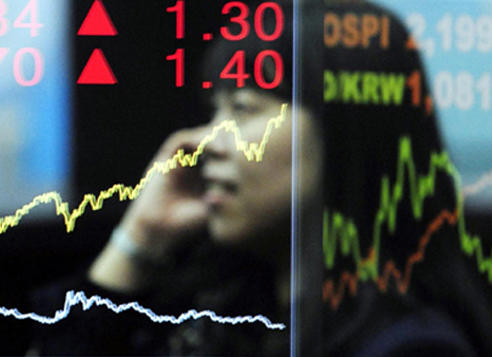Although tied down by political hurdles and security and diplomatic challenges, the liberal Moon Jae-in administration is finishing its first month in office with rosier economic indications than those under the former Park Geun-hye administration, various data showed Thursday.
The benchmark Korea Composite Stock Price Index jumped 2.94 percent to 2,360.14 as of Wednesday’s close from May 8, the day before the presidential election.

The Kospi’s nearly 3 percent rise in the first month of Moon’s inauguration was the fastest, compared to the previous six administrations, data by the Korea Exchange showed. The six former presidents -- Kim Young-sam, Kim Dae-jung, Roh Moo-hyun, Lee Myung-bak and Park -- all saw the Kospi falling in the first month of their tenures.
Under the Moon government, the main bourse’s market cap also grew quickly by 41 trillion won ($36.5 billion) in one month to more than 1,528 trillion won as of Wednesday.
The Kospi hit a record high of 2,376.83 during intraday trading Monday, with most analysts predicting the index to surpass the 2,400 threshold soon.
The tech-heavy Kosdaq’s market cap also marked a historic high of 220.34 trillion won Wednesday, with the index closing at this year’s high of 666.46.
Consumer sentiment is also showing signs of recovery.
The Bank of Korea’s latest data showed that the composite consumer sentiment index rose by 6.8 points to 108 in May from the previous month. The rise by 6.8 points was the fastest since a 7.5 point gain in August 2009.
The BOK is likely to come up with a rosier growth forecast for this year in July, as the nation’s gross domestic product grew 1.1 percent in the first quarter, much faster than the expected 0.9 percent.
“It is a good start. Various economic circumstances improved, including exports, which rebounded with a recovery in the global economy. People’s anticipation for a better economy grew as the government pushes for an extra budget,” Lee Geun-tae, research fellow at the LG Economic Research Institute, told The Korea Herald.
“What’s important for now is that this positive sentiment, mainly coming from robust semiconductor exports, should also raise domestic demand.”
Lee noted, however, that the government should take caution in the recent rise in home prices in Seoul and prepare measures to make sure property bubbles do not generate unnecessary jitters in the market.
Home prices in Seoul rose 0.13 percent over the last week of May, according to data compiled by Kookmin Bank. It marked the first time in seven months the price rose more than 0.1 percent weekly. The data also showed that housing prices in Seoul had risen 17 consecutive weeks.
By Kim Yoon-mi (
yoonmi@heraldcorp.com)








